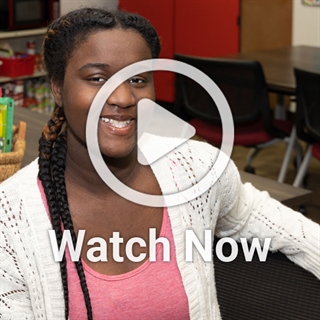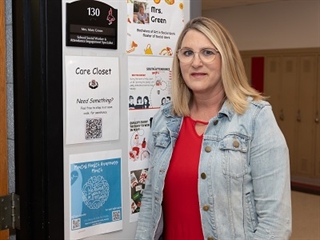
In a crowded high school hallway, students talk about recent exams, plans for summer, and check their social media for the latest on what their friends are doing, the best makeup trend, or the coolest new style. On the outside, students are smiling, joking, and laughing. On the inside, almost half of them feel hopeless and alone.
Youth and young adults living with a known or unknown mental health distress know that their feelings can’t be resolved by going for a run, thinking happy thoughts, or just logging off social media. They also don’t know what would help, and so they may feel alone and trapped. Schools like Waukesha South High School are looking to change that by working to become a Mental Health School of Distinction through United Way of Greater Milwaukee & Waukesha County’s Empowering Minds initiative.
High school students face an enormous number of expectations, challenges, and insecurities every day. Pressures from school, family, social media, and peers all affect mental health. Some students can address these pressures appropriately. And some are overwhelmed.
“Those pressures about being a certain way, looking a certain way, wearing a certain thing really impact the adolescent mind about fitting in,” said Mary Green, the Student Attendance and Engagement Specialist at Waukesha South. “That’s where they are developmentally, fitting in, developing the ability to be their own person.”
Struggling with mental health can look obvious, like school avoidance or panic attacks in the bathroom, but there are unseen struggles as well, such as a persistent feeling of worry or stress and feeling sad all the time. The disconnect can make someone struggling feel sluggish and unmotivated. The stigma surrounding mental health furthers this disconnect among students.
“Sometimes life just spirals out of hand, and you can’t really control it,” noted Briasia, a sophomore at the school. “From the outside looking in, someone can’t understand it. You can’t really ‘get over it.’”
“Students often have the misconception that what they’re feeling isn’t real,” said Mary. “That mental health means 'you’re crazy.'”
Briasia noted that it’s currently a hard topic to talk about with her friends, but it’s easier when they have shared experiences. She is a member of her school's Peers for Peers club, which supports students’ mental health.
“It's mostly about mental health in general. It's not just about substance use or traumatic experiences. It's about everyday life. And that's what I love about this club, and I encourage people to join it because it really supports the community as a whole. I feel that’s what we need in this generation.”
Empowering Minds is a unique health initiative because it’s centered in schools, which allows help to reach youth where they spend most of their day. According to the CDC, 44% of American teenagers felt persistent feelings of sadness or hopelessness in 2021, which is the highest level ever recorded. Data from the CDC also shows that more than a third of high school students reported they experienced poor mental health during the height of the pandemic. According to the World Health Organization, half of all mental health conditions start by age 14, with most cases going undetected and untreated until many years later or sometimes not at all. Through United Way’s Empowering Minds initiative, teens and their families will have access to healthier school environments.
When students aren’t in school, friends and families can take what they learn home.
“ Just be a good listener,” Mary urged. “Pay attention to what you see, what your child is saying. Carve out time to check in with your child. ‘How’s it going? What can I help with? What are you stressed about?’”
Just be a good listener,” Mary urged. “Pay attention to what you see, what your child is saying. Carve out time to check in with your child. ‘How’s it going? What can I help with? What are you stressed about?’”
She also noted that many parents have a misconception that mental health is a phase. “If it lasts longer than two weeks, we need to look more into what’s going on. Other kids, other people, have issues too, and it does not mean 'you’re crazy'. It means something isn’t right and there are people and ways to make it better so you can go on and achieve what you want to achieve.”
“It’s not just a minor thing or an easy fix,” Briasia said. “Your child is trying.”
The Empowering Minds initiative is still in its first year, but already has schools buzzing. Students and staff at Waukesha South High School and beyond look forward to its impact.
“It has the opportunity to expose awareness to so many students, families, and teachers,” Mary said reflecting on the initiative. “It’s going to bring mental health to the forefront and make it okay to get help.”
When you give to United Way, you're not just making a donation. You're changing a life. Briasia, Mary, Waukesha South High School, and the mental health experts who helped make Empowering Minds a reality remind us that to live better, we must Live United.
Are you in crisis? If you or someone you know needs support now, reach out to the 988 Suicide and Crisis Lifeline. Call or text 988, or chat 988lifeline.org.
Donate